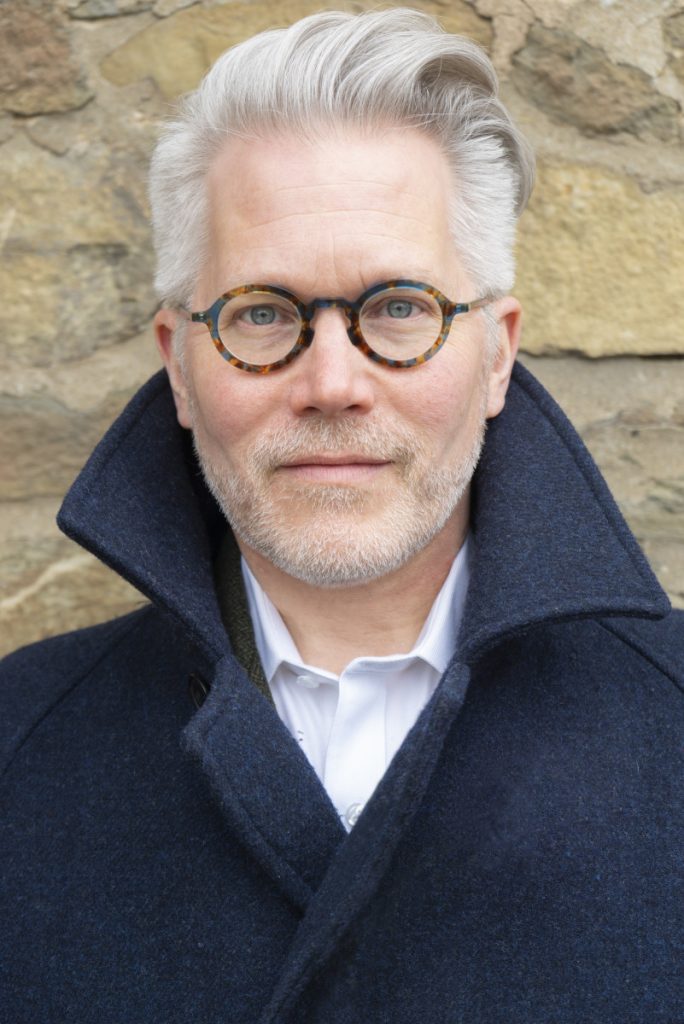
My suffering did not last, though once I recovered, I knew that I had been changed by the experience.
Mark Wunderlich, author of
the poem series “Sky Burial” (NER 40.3).
Photo credit: Nicholas Kahn
Why do poets write about the worst things that have happened to them? What do we mean when we refer to our identity? Does our identity consist of the totality of what we do and say? What we know and make? What others have done to us? What portion of our identity do we inherit from our family and ancestors? Which parts of our inheritance can we choose, and which can we reject? What does it mean to be a victim, and is victimhood a part of an identity? These are the questions that drove me to write the poem series called “Sky Burial,” on a summer day in Umbria where I had gone on an artists’ residency. The poem also recalls the summer of 2015, when, after several months in a diagnosed major depression, during which the medications I was taking were not delivering relief, and the lifeline of therapy, though usually a reliable source of comfort and connection, was now beginning to fray, and as my much-hoped-for recovery started to seem unattainable, I found myself sitting in the grass in my yard with the barrel of a shotgun in my mouth and my finger on the trigger, rehearsing my own violent death.
For anyone reading this, I want you to know that I recovered. As in my previous depressive episodes, the medication started to work, and I began to pull myself out of a vast emptiness that was my mental illness; the poem explains—I hope—just what came between me and my wish to end my own life. I did not pull the trigger that day, nor the next, and with each passing day I began the slow process of returning to myself, of shedding the bleakness and ugliness around me, of awakening my instinct for survival. Weeks later, a day came when I was outside with the sun on my face, and I remember smelling the trail of wood smoke on the air and thinking how wonderful it smelled—homey and comforting and sharp—and just like that I had experienced pleasure once again. Therapy helped me to understand how my life had come undone, and an SSRI helped to lift me from a torpor and a lassitude that had enveloped me for months.
My suffering did not last, though once I recovered, I knew that I had been changed by the experience. I came to see my suicidal episode as a metaphorical death, my depression as a kind of trip through the deep recesses of the underworld. As part of my recovery, I began to tell the story of my time wandering in the land of shades. The poem sequence documents my survival, but it is also testament to my unwillingness to see myself as damaged, or as a victim making a play for your sympathy. Instead, I see the poem as a meditation on the nature of suffering, and on our ability to survive just about anything. I am not a damaged person for having suffered my own illness, having withstood the violence of others, or having inherited an unhappy family history. I am neither the hero nor the victim of my own circumstances. I want experience to mean something, and poetry is the most reliable mechanism I know by which I can render experience into something durable, useful, and encompassing, and which makes the lived life a life of meaning.
Mark Wunderlich is the author of four books of poems, most recently God of Nothingness (Graywolf, 2021). His other books are The Earth Avails (Graywolf, 2014), which received the Rilke Prize, Voluntary Servitude (Graywolf, 2004), and The Anchorage (University of Massachusetts, 1999), which received the Lambda Literary Award. He directs the Bennington Writing Seminars graduate writing program and lives in New York’s Hudson Valley.